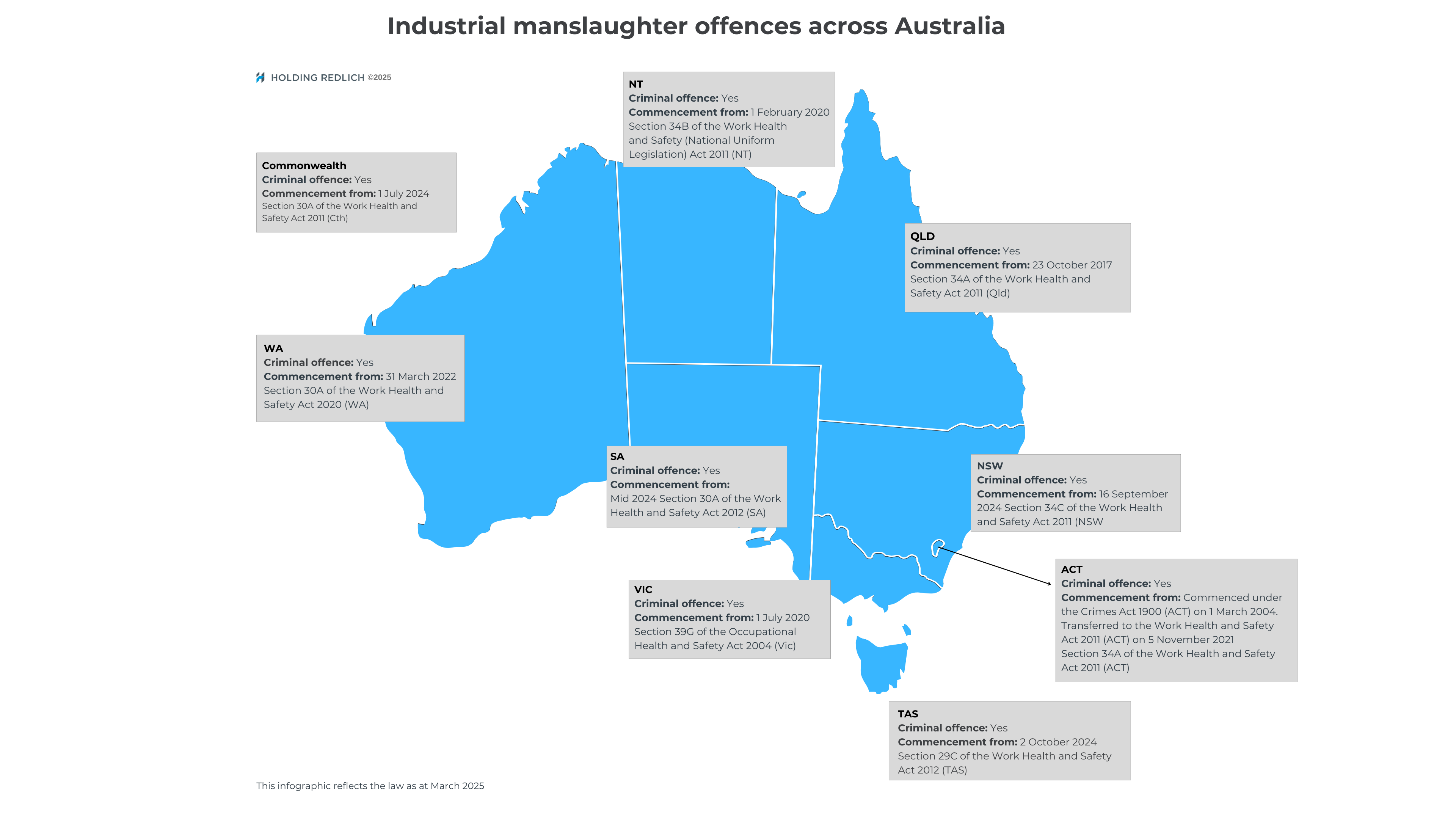[Updated March 2025]
With the number of workplace fatalities increasing, employers need to be aware of the industrial manslaughter offences that are being enacted across all Australian jurisdictions. The Commonwealth and South Australia have recently (in late 2023) passed industrial manslaughter offences with New South Wales likely to table a bill this year. Tasmania is the only jurisdiction at this stage that is not proposing to introduce the offence.
What is industrial manslaughter?
Industrial manslaughter refers to the offence where a person conducting a business or undertaking (PCBU) has recklessly or negligently failed to ensure the safety of workers, or others impacted by their business or undertaking, leading to a death.
Although the legal test differs across jurisdictions, essentially an individual or PCBU commits industrial manslaughter if the person has a WHS duty under the safety laws; they engage in conduct that breaches a duty of care they owe under the WHS laws and that conduct causes the death of an individual, in circumstances where the person engages in the conduct knowing it is likely to cause the death or serious harm to an individual, or in disregard of that likelihood.
Overview of industrial manslaughter offences across Australia

Commonwealth
- On 4 September 2023, the Fair Work Legislation Amendment (Closing Loopholes) Bill 2023 (Cth) was introduced to Parliament, proposing a sweep of changes to the Fair Work Act 2009 (Cth) and the Work Health and Safety Act 2011 (Cth). One of the key work health and safety amendments was to criminalise industrial manslaughter at a federal level.
- The offence will commence on 1 July 2024 under a new section 30A of the Work Health and Safety Act 2011 (Cth) but will have limited application as it only applies to the Commonwealth public sector.
- The maximum penalty for a PCBU (individual) is 25 years imprisonment, and for a PCBU (body corporate) is a fine of $18,000,000.
Australian Capital Territory
- Industrial manslaughter has been an offence in the ACT since 2004. It was originally introduced under the Crimes Act 1900 (ACT) and was transferred to section 34A of the Work Health and Safety Act 2011 (ACT) on 5 November 2021 pursuant to the Work Health and Safety Amendment Act 2021 (ACT).
- The maximum penalty for a PCBU (individual) is 20 years imprisonment, and for a PCBU (corporate) is a fine of $16,500,000.
- The offence of industrial manslaughter has not been prosecuted in the ACT.
New South Wales
- Industrial manslaughter provisions came into effect on 16 September 2024 under section 34C of the Work Health and Safety Act 2011 (NSW).
Northern Territory
- The offence of industrial manslaughter came into effect in the Northern Territory on 1 February 2020 under section 34B of the Work health and Safety (National Uniform Legislation) Act 2011 (NT).
- The maximum penalty for a PCBU (individual) is imprisonment for life, and for a PCBU (corporate) is 65,000 penalty units (which is currently $11,440,000 as at February 2024).
- NT WorkSafe has charged two PCBUs with industrial manslaughter:
- the first charge was against Kalidonis NT Pty Ltd, one of Darwin’s largest privately owned construction companies, following a workplace incident where a man was killed after a chain allegedly failed and struck him during an excavator towing operation. NT WorkSafe has since withdrawn the charge, but the company is still facing penalties for failure to comply with its health and safety duties
- the second charge is against an individual, Mr Craig Williams trading as Rainbow Beach Constructions, in relation to a death of one of his workers after he fell approximately 3.2 metres through an unguarded void while moving cabinets. Mr Williams has been committed by the Darwin Local Court to stand trial in the NT Supreme Court. An arraignment hearing in the NT Supreme Court has been listed on 14 March 2024.
Queensland
- Queensland introduced the offence of industrial manslaughter in 2017 under section 34C of the Work Health and Safety Act 2011 (Qld).
- The maximum penalty for a PCBU (individual) is 20 years imprisonment and for a PCBU (corporate) is 100,000 penalty units (which is $15,480,000 as at February 2024).
- Queensland is the first state to record a conviction for industrial manslaughter against a body corporate and an individual.
- In R v Brisbane Auto Recycling Pty Ltd [2020] QDC 113, the company was convicted and fined $3 million and two directors were convicted and sentenced to 10 months imprisonment, with a suspended sentence, after a worker was killed by a reversing forklift truck driven by an unlicensed driver with no traffic management safety systems in place.
- In the 2022 case, R v Jeffrey Owens [2022] QDCSR 168, an individual was convicted and sentenced to five years prison (suspended after 18 months) after he negligently caused the death of a worker who was crushed by a generator that fell on him from a moving forklift.
South Australia
- The South Australian Parliament passed the Work Health and Safety (Industrial Manslaughter) Amendment Bill 2023 (SA) on 29 December 2023. The Bill introduces a new offence of industrial manslaughter under section 30A of the Work Health and Safety Act 2012 (SA).
- The Bill received royal assent and came into effect on 7 December 2023, becoming the Work Health and Safety (Industrial Manslaughter) Amendment Act 2023 (SA).
- The new offence will only come into effect later this year as part 2 of the amending Act, the offence will come into force by proclamation, which is estimated to be in mid 2024.
- The maximum penalty for a PCBU (individual) is 20 years imprisonment, and for a PCBU (corporate) is a fine of $18 million.
Tasmania
- Industrial manslaughter provisions came into effect on 2 October 2024 under section 29C of the Work Health and Safety Act 2012 (TAS).
Victoria
- “Workplace manslaughter” is an offence in Victoria according to section 39G of the Occupational Health and Safety Act 2004 (Vic). It was introduced under the Workplace Safety Legislation Amendment (Workplace Manslaughter and Other Matters) Bill 2019 (Vic), which commenced on 1 July 2020.
- The maximum penalty for an individual is 25 years imprisonment, and for a body corporate 100,000 penalty units (which is $19,231,000 as at February 2024).
- On 19 February 2024, Victoria recorded its first conviction of workplace manslaughter against a stonemasonry business. This followed a workplace incident where the director was operating a loaded forklift which tipped over and landed on a 25-year old subcontractor, causing the worker’s death. LH Holding Management Pty Ltd was convicted and fined $1.3 million and the sole director was also convicted, placed on a two-year Community Corrections Order to complete 200 hours of unpaid community work and ordered to complete a course in forklift operation. A summary of the case can be read here. WorkSafe Vic has charged another three companies with workplace manslaughter in the last four years. The first charge is against a centenary bakehouse following the death of a worker who fell approximately four metres while removing suspended ceiling panels at a warehouse. The second and third charge of industrial manslaughter relates to an incident where a 21-year old apprentice electrician was electrocuted while working on a car lift at an apartment building.
Western Australia
- Industrial manslaughter became an offence in Western Australia on 31 March 2022 under section 30A of the Work Health and Safety Act 2020 (WA).
- The maximum penalty for a PCBU (individual) is 20 years imprisonment and a fine of $5 million, while the penalty for a PCBU (corporate) is a fine of $10 million.
- There have been no charges or prosecution of industrial manslaughter in Western Australia.
If you have any questions regarding industrial manslaughter offences in your jurisdiction, please get in touch with a member of our team below.
Disclaimer
The information in this publication is of a general nature and is not intended to address the circumstances of any particular individual or entity. Although we endeavour to provide accurate and timely information, we do not guarantee that the information in this article is accurate at the date it is received or that it will continue to be accurate in the future.
Share this

